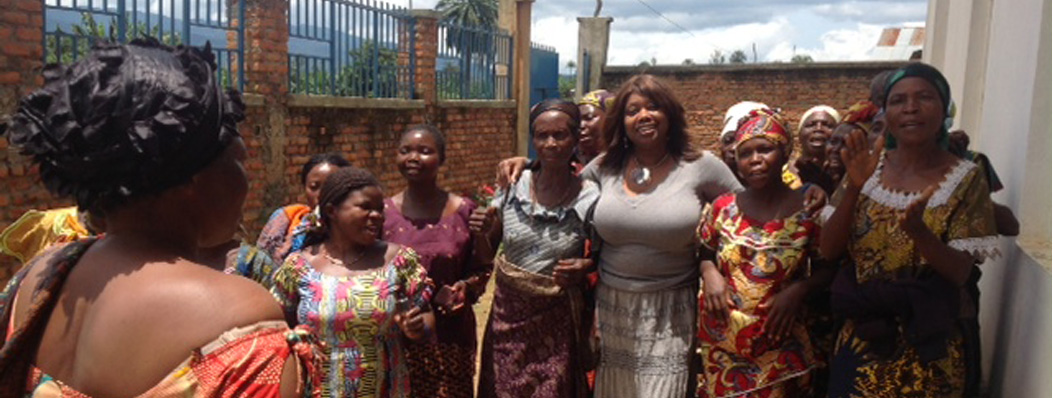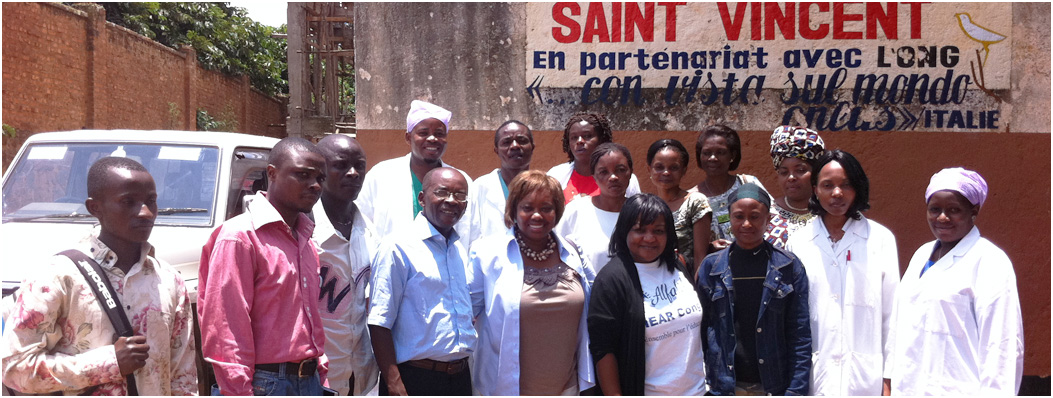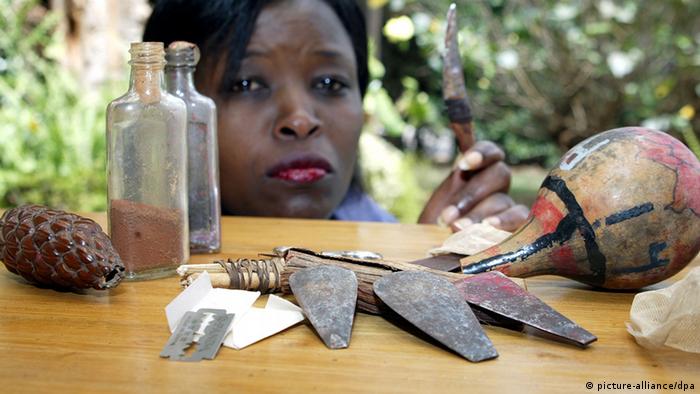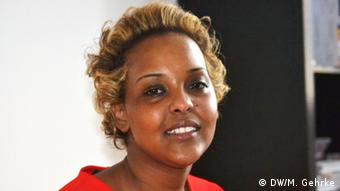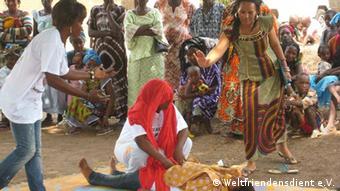If you prefer to donate by mail, please send a check to :
Footprints Foundation 4000 Ponce Deleon Blvd .
Ste 470 Coral Gables Florida 33146
HUMAN RIGHTS
The fight against female genital mutilation
Between 130 and 150 million women are victims of genital mutilation – most of them are Africans. Now, doctors, teachers and social workers in Germany are increasingly being confronted by this practice.
Somalian Jawahir Cumar moved to Germany with her parents when she was a girl. Later, on a visit to her grandparents’ village when she was 20, Jawahir witnessed the funeral of young girl who had bled to death after being “circumcised.”
“And then I saw another case,” the now 36 year old says. “A pregnant woman was in labor. She had never been to a doctor, there was nowhere for her to get ultrasound in the area – the next hospital was 900 kilometers away, in Mogadishu. After the birth of the child, the woman was sewn up again.”
The midwife had overlooked the fact that the woman had been carrying twins, so she was still in pain. She was later transported to Mogadishu by car – a journey that took two days. And although she survived, the second twin died.
Severe health damage
Female genital mutilation (FGM) is currently practiced in 29 African countries, despite being illegal in some. It is usually done when girls are between the ages of four and eight – using varying instruments, ranging from razor blades, kitchen knives to broken glass and tin lids. And because these tools are used more than once, it also increases the risk of spreading diseases like HIV/AIDS and hepatitis.
Female genital mutilation includes procedures that intentionally alter or cause injury to female genitalia for non-medical reasons, according to the World Health Organization (WHO). These practices include partial or total removal of the clitoris, the removal of the labia and narrowing the vaginal opening by creating a covering seal to leave a small opening of about two to four millimeters.
About 15 percent of the women who have been cut (especially in Somalia and Sudan) have also undergone infibulation, which results in the vaginal opening being almost sealed completely.
“If the vagina is almost closed, urine and menstrual fluids can hardly be discharged and remain trapped as a result,” explains Dr. Christoph Zerm, a gynecologist who specializes in counseling and treating women who have undergone FGM.
“This creates an environment that is conducive for infections. It can cause severe illness in the urinary tract and even the kidney. The uterus, ovaries and the fallopian tubes can also get infected,” he adds.
And for these women, even urinating, which can take up to 30 minutes, is painful.
Raising awareness in Germany
Jawahir was just a girl when she was cut. As a result, she had to have several surgeries in Germany to reverse the infibulation. She wants to prevent other girls and women from having a similar experience. That’s why she founded “Stop Mutilation.”
“The immigrants that come here bring this problem with them. That’s what made me create this organization in 1996,” says Jawahir, who is now a mother of three.
An estimated 30,000 women living in Germany have been been subjected to FGM and 6,000 girls are at risk, according to human rights organization Terre des Femmes. Pressure from families in their countries of origin plays a big role.
“Mothers-in-law and grandmothers, especially, call all the time, write letters and send messages,” says Jawahir Cumar. And the message is always the same, “[they say] you have to cut your daughters! Or just bring them to us and we will do it,” she adds.
Jawahir visits kindergartens and advises teachers on how they can raise awareness about FGM. She also targets African immigrants in her advocacy work.
“Many of them don’t know that [female genital mutilation] is prohibited in Germany. They are shocked when they hear that they could lose custody for their children,” Jawahir says.
She was able to prevent 17 girls from getting being subjected to FGM last year.
Getting Africans to ban FGM
Somalian Fadumo Korn also talks about FGM with immigrant families from Somalia and other African countries. She warns them that it can result in a prison sentence or deportation.
“It only works from one African to another,” she says, because Europeans are often not seen as the right people to raise awareness in Africa.
“It is easy for me because I am also a victim. No one can tell me that genital mutilation isn’t bad,” Fadumo adds.
Together with Nala, an association in Frankfurt, she was able to convince 18,000 people from a community in northeastern Burkina Faso to publicly renounce FGM.
“We got support from the local imam and the head priest of the Christian community, as well as the chief of this region for our campaign. These three men stood up and told their community that FGM is forbidden,” Fadumo explains.
Even though religion is often used to justify FGM, neither Islam nor Christianity demand it of their followers. Fadumo believes it is important for religious leaders to clearly speak out against the practice to change tradition in their communities.
“Whether it’s Islam or Christianity, we use all religions to tell people, ‘Your God will be angry with you, if you circumcise his children,'” she says.
Re-education is key
Both Jawahir and Fadomo, and activists in Africa face major challenges in the fight against female genital mutilation. Women practicing FGM have to be re-educated and families have to be convinced to let their daughters grow up without being cut.
“Men have to learn than a woman who is not cut can also have children and make her husband happy,” Jawahir Cumar says, while adding that families also need to recognize the importance of education for their daughters.
But there’s still a lot of work to be done in Germany as well, says Jawahir, pointing to how long it took for forced marriages and “honor killings” to be regarded as a criminal offence and not simply as the customs of immigrants.
Gynecologist Christoph Zerm would like medical students to learn more about FGM, so doctors can provide better care to women who are affected.
DW.DE
IN FOCUS: Putting a stop to female genital mutilation
Author Mirjam Gehrke / es
Copied from DW





